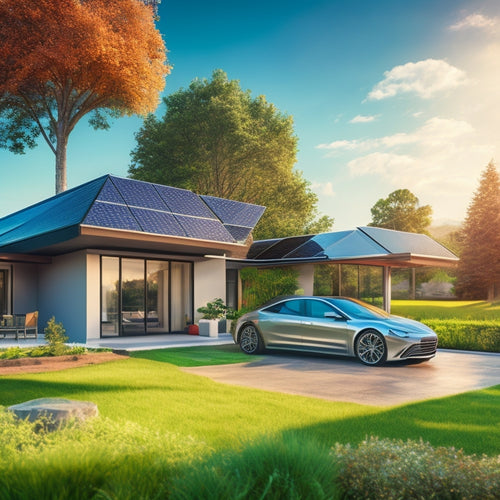
What Are the Best Solar Panels With Integrated Battery Storage
Share
When searching for the best solar panels with integrated battery storage, you'll want to examine top brands like Tesla, LG, and Sonnen, which offer advanced features like MPPT and smart monitoring. Key factors to evaluate include battery chemistry and design, depth of discharge, round-trip efficiency, and solar panel efficiency. Models like Tesla's Powerwall, LG's RESU, and Sonnen's eco offer varying capacities and warranties. As you investigate your options, you'll want to weigh performance, cost, and maintenance requirements against the benefits of energy independence, reliability, and increased property value - and there's more to uncover as you delve into the world of integrated solar energy systems.
Key Takeaways
- The best solar panels with integrated battery storage balance energy management, reliability, and efficiency, enhancing overall system performance.
- Top brands like Tesla, LG, and Sonnen offer high-quality integrated storage solutions with varying capacities and warranties.
- Key features to consider include battery chemistry, depth of discharge, round-trip efficiency, solar panel efficiency, and monitoring capabilities.
- Leading models like Tesla Powerwall, LG Chem RESU, and Sonnen eco offer advanced features like MPPT and smart monitoring to enhance performance.
- When selecting an integrated system, assess energy needs, roof characteristics, local regulations, installer expertise, and warranty support to ensure optimal performance.
Benefits of Integrated Storage
When considering a solar panel system, one of the most significant advantages of integrated storage is the ability to harvest and store excess energy generated during the day for use during the night or on cloudy days.
This means you can enjoy a reliable source of power, even when the sun isn't shining. With integrated storage, you're not limited to using your solar energy in real-time, which can be a major drawback of traditional solar panel systems.
Instead, you can store excess energy for later use, reducing your reliance on the grid and increasing your energy independence.
Top Brands and Models
You're likely looking for high-quality solar panels with battery storage from reputable brands that offer reliable performance and efficient energy harvesting.
When it comes to integrated storage solutions, leading manufacturers like Tesla, LG, and Sonnen stand out from the rest with their innovative products and state-of-the-art technology.
Your top picks will likely include models like the Tesla Powerwall, LG Chem RESU, and Sonnen eco, which have proven themselves in the market.
Top Picks
Tapping into the power of solar energy has become increasingly accessible, and pairing it with battery storage takes it to the next level. As you investigate the best solar panels with integrated battery storage, you'll want to evaluate top picks that align with your specific needs and goals.
When it comes to solar technology trends, you'll want to look for models that incorporate advanced features like maximum power point tracking (MPPT) and smart monitoring capabilities.
In terms of battery lifespan considerations, focus on models with high-depth-of-discharge (DOD) ratings and extended warranties. Based on these factors, some top picks include the Tesla Powerwall, LG Chem RESU, and Sonnen eco.
The Tesla Powerwall boasts a 13.5 kWh capacity and 10-year warranty, while the LG Chem RESU offers a 3.3-12.8 kWh capacity range and 10-year warranty. The Sonnen eco provides a 2-16 kWh capacity range and 10-year warranty.
These models represent the forefront of solar technology trends and offer reliable, long-lasting performance.
Leading Manufacturers
You've narrowed down your options to the top solar panels with battery storage, now it's time to investigate the leading manufacturers behind these innovative systems. As you examine the market, you'll notice that top brands are driving market trends with their innovative designs.
Companies like Tesla, LG, and Sonnen are pushing the boundaries of energy storage technology, offering sleek and efficient solutions for homeowners.
Tesla's Powerwall is a popular choice, known for its compact design and seamless integration with solar panels. LG's Chem RESU series offers a range of battery sizes to fit different energy needs, while Sonnen's eco series boasts advanced smart energy management capabilities.
Other notable manufacturers include SimpliPhi Power, PylonTech, and BYD, each offering unique features and benefits.
When evaluating these top brands, consider factors like battery capacity, depth of discharge, and warranty length to find the best fit for your energy needs.
Key Features to Consider
What sets apart a reliable solar panel system with battery storage from a mediocre one? When shopping for a solar panel system with integrated battery storage, you'll want to take into account several key features that impact its overall performance and lifespan.
First, look at the battery's chemistry and design. A high-quality battery with a proven track record of longevity is essential. You'll want to take into account the battery's depth of discharge (DOD), round-trip efficiency, and warranty. A higher DOD means the battery can store more energy, while a higher round-trip efficiency means less energy is lost during charging and discharging.
Next, evaluate the solar panel's efficiency. A more efficient panel can generate more power per hour of sunlight, which can lead to faster charging times and more energy storage. Consider the panel's temperature coefficient, which affects its performance in high temperatures.
Lastly, take into account the system's monitoring and control capabilities. A sophisticated monitoring system can help you track your energy production, consumption, and storage, ensuring your system is operating at its best.
Performance and Efficiency
When evaluating solar panels with battery storage, you'll want to take into account two critical performance metrics: energy conversion rate, which measures how efficiently the panels convert sunlight into electrical energy, and power output capacity, which determines how much electricity the system can produce at peak performance.
A higher energy conversion rate means more energy is harvested from the sun, while a higher power output capacity guarantees you can power more appliances and devices.
Energy Conversion Rate
Frequently, homeowners considering solar panels with battery storage overlook an essential aspect: the energy conversion rate. This metric measures how efficiently your solar panels convert sunlight into usable electricity. A higher energy conversion rate means you'll generate more power from the same amount of sunlight.
When evaluating solar panels with integrated battery storage, you should look for models with high energy conversion rates, typically above 20%.
Recent solar technology advancements have led to significant improvements in energy conversion rates. This means you can now get more power from your solar panels, which is especially important when considering battery storage.
A higher energy conversion rate also extends the battery lifespan considerations, as your battery will last longer with a more efficient charging process. When researching different models, be sure to check the energy conversion rate, as it directly impacts your overall energy production and storage capabilities.
Power Output Capacity
Maximize your solar panels with battery storage by examining the power output capacity, a critical factor that directly affects your system's performance and efficiency. This feature determines how much electricity your system can generate at any given time, which in turn impacts your energy independence.
When evaluating power output capacity, consider the maximum power your system can produce, typically measured in watts (W). A higher power output capacity guarantees you can power more appliances or charge your batteries faster.
Look for systems with a high maximum power point tracking (MPPT) rating, as this enables your system to enhance energy production. Additionally, consider the continuous power output, which indicates the system's ability to sustain power generation over an extended period.
A higher power output capacity translates to more energy independence, as you'll be able to generate more power during the day and store excess energy in your batteries for later use.
Cost and Value Analysis
Your energy independence goals come with a price tag, and understanding the cost and value analysis of solar panels with battery storage is vital to making an informed decision.
The upfront cost of these systems can be substantial, but it's important to evaluate the long-term benefits and savings. Financing options, such as loans or power purchase agreements, can help make the initial investment more manageable.
When evaluating the cost, examine the overall value proposition: reduced energy bills, increased property value, and a potential return on investment (ROI) of 10-15% over the system's lifespan.
Additionally, many governments offer incentives, such as tax credits or rebates, to encourage the adoption of renewable energy systems.
Installation and Maintenance
The solar panel and battery storage system installation process requires careful planning and execution to ascertain a safe, efficient, and code-compliant setup. You'll need to evaluate factors such as roof size, orientation, and shading, as well as local building codes and regulations. A professional installer will assess your energy needs and design a customized system that meets your requirements.
| Installation Step | Description |
|---|---|
| Site Assessment | Evaluate roof condition, size, and orientation to determine ideal system design |
| System Design | Customized design based on energy needs, roof layout, and local building codes |
| Installation | Mounting and connecting solar panels, inverter, and battery storage system |
| Testing and Commissioning | Verify system performance, ascertain safety, and provide training on operation and maintenance |
To guarantee peak performance and longevity, you'll need to perform regular maintenance on your solar panel and battery storage system. Some maintenance tips include:
- Inspect the system regularly for signs of wear and tear
- Clean the solar panels to maintain efficiency
- Monitor the system's performance and address any issues promptly
Frequently Asked Questions
Can I Use Integrated Storage Solar Panels for My RV or Boat?
You can definitely use integrated storage solar panels for your RV or boat, as they provide efficient RV power and enhance boat efficiency, allowing you to enjoy off-grid excursions while maintaining a reliable energy supply.
Are Integrated Storage Solar Panels Compatible With Existing Solar Systems?
You'll be relieved to know that, like the case of SunPower's SunVault, integrated storage solar panels can seamlessly integrate with existing systems, addressing compatibility concerns and ensuring peak performance efficiency, allowing you to maximize your energy harvest.
Do Integrated Storage Solar Panels Require Additional Installation Permits?
When you opt for integrated storage solar panels, you'll need to steer through installation regulations, which often involve obtaining additional permits. You'll need to check local permit requirements, ensuring compliance with codes and ordinances, before installing your system.
Can I Monitor and Control the Battery Remotely Through an App?
As you're the captain of your energy ship, you want to steer your battery's performance from afar. Yes, you can remotely monitor and control your integrated storage solar panels through a dedicated app, enjoying features like real-time tracking, customizable alerts, and seamless energy management.
Are Integrated Storage Solar Panels Covered by a Single Warranty?
You'll typically find that integrated storage solar panels are backed by a single warranty, ensuring performance longevity and cost efficiency, giving you peace of mind and a hassle-free experience.
Conclusion
As you traverse the intricate terrain of solar panels with integrated battery storage, remember that the perfect system is like a key that opens the door to energy independence. With the top brands and models offering advanced technology, sleek designs, and impressive performance, you're spoiled for choice. By considering the key features, performance, and cost, you'll find the ideal system that harmonizes with your energy needs and budget, illuminating the path to a sustainable future.
Related Posts
-

What Solar Panels Work Best With EVS Online?
When shopping for solar panels online to power your electric vehicle, look for high-efficiency models that can withst...
-

10 Tips for Cleaner City Air With Scooters
By adopting a few simple habits, you can make a significant impact on reducing city air pollution with your scooter. ...
-

Planning for an Electric Vehicle-Friendly Urban Future
As you plan for an electric vehicle-friendly urban future, you'll need to integrate high-power charging stations, sma...


